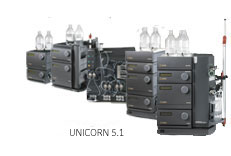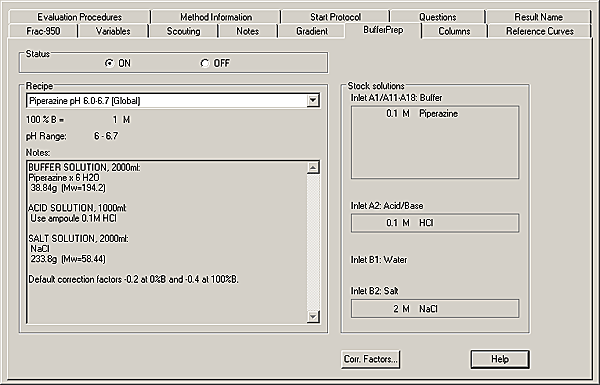

|
|

|
|
The BufferPrep tab
|

|
|
BufferPrep usage

|
BufferPrep allows a buffer of
different pH and salt concentrations to be prepared on-line from
four stock solutions. This removes the need to manually prepare
new buffers every time the pH needs to be changed. Linear and step
salt gradients can be run and pH can be used as a variable scouting
parameter. BufferPrep is
optimized for cation and anion exchange chromatography. For a complete
description of BufferPrep,
see the user manual for ─KTAdesign systems.
Note:
BufferPrep is only available for
some ─KTAdesign systems.
|
|
|
|
|
Illustration

|
The illustration below shows an example of the BufferPrep tab:

|
|
|
|
|
Stock solutions

|
The
solutions and the inlets to which they should be connected are displayed
to the right of the dialog box. Accuracy of preparation is essential.
The four stock solutions consist of:
-
a mix of buffering
components (there can be up to five different buffering components
enabling a broad pH range to be covered),
-
an acid (HCl) or base (NaOH) for pH on-line titration,
-
distilled water,
-
an inert salt (for example NaCl) for salt gradient
formation.
|
|
|
|
|
How to create a BufferPrep method

|
If
a suitable template or wizard is not available, you can create a BufferPrep method yourself. The
instruction BufferPrep_pH must
be available at breakpoint zero at the beginning of the method.
The method must not contain the instructions PumpAInlet or PumpBInlet.
The table shows one way to create a BufferPrep method.
|
Step
|
Action
|
|
1
|
In the Text Instruction editor:
|
|
2
|
Change to the Run Setup.
-
Select the BufferPrep tab.
-
Click the ON radio
button in the Status field.
-
Select a Recipe from
the drop-down list box. There are two main alternatives:
AIEX or CIEX,
which are recipes covering a broad pH range,
single buffer recipes for more narrow pH ranges.
Result: All information
relevant to the selected recipe will be displayed on the tab.
|
|
3
|
Prepare the required stock solutions.
|
|
4
|
Do one of the following:
-
Select the Variables tab. Set the required
pH for the method run in the variable BufferPrep_pH,
or
-
If you want to perform pH scouting, click the Scouting tab and select BufferPrep_pH as a scouting variable.
Enter the pH values for the different runs.
|
BufferPrep recipes
The recipe saved in the method (the one selected on the BufferPrep tab) cannot be edited,
although fine tuning is possible. However, the recipes on the list
of all BufferPrep recipes
can be edited. New recipes can also be created (see How to create and edit BufferPrep recipes).
|
|
|
|
|
How to fine tune the BufferPrep recipe with correction factors

|
In
order to obtain high pH accuracy, the recipe can be fine tuned around
a specific pH by setting correction factors. The table below describes
how to fine tune the recipe with correction factors:
|
Step
|
Action
|
|
1
|
In System Control,
select Manual: Other.
|
|
2
|
Select BufferPrep Recipe and Recipe Name.
Click the Execute button.
|
|
3
|
|
|
4
|
|
|
5
|
Check the pH reading when stable. Allow at least 30
ml of eluent to pass through before expecting a steady pH reading.
|
|
6
|
|
|
7
|
Check the pH reading when stable at 100% B.
|
|
8
|
-
If the readings
are acceptable at both 0% and 100%, the correction factors do not
need to be changed.
-
If the readings are not acceptable, click the Corr. Factors button in the BufferPrep tab in the method.
|
|
9
|
Enter the deviation at 0% and 100%. (e.g., if the pH
is set to 7.0 and the actual pH is 7.1 enter 0.1. Enter -0.1 if
the pH is 6.9).
Note: If correction
factors already exist, the measured pH deviation should be added
to the old factors.
|
|
10
|
Save the method.
|
Note: When changing
the correction factors for the recipe selected in the method, the
recipe with the same name on the list of all BufferPrep recipes is not affected.
The changes will only apply in the specific method.
|
|
|
|
2005-06-15
|
|
|

